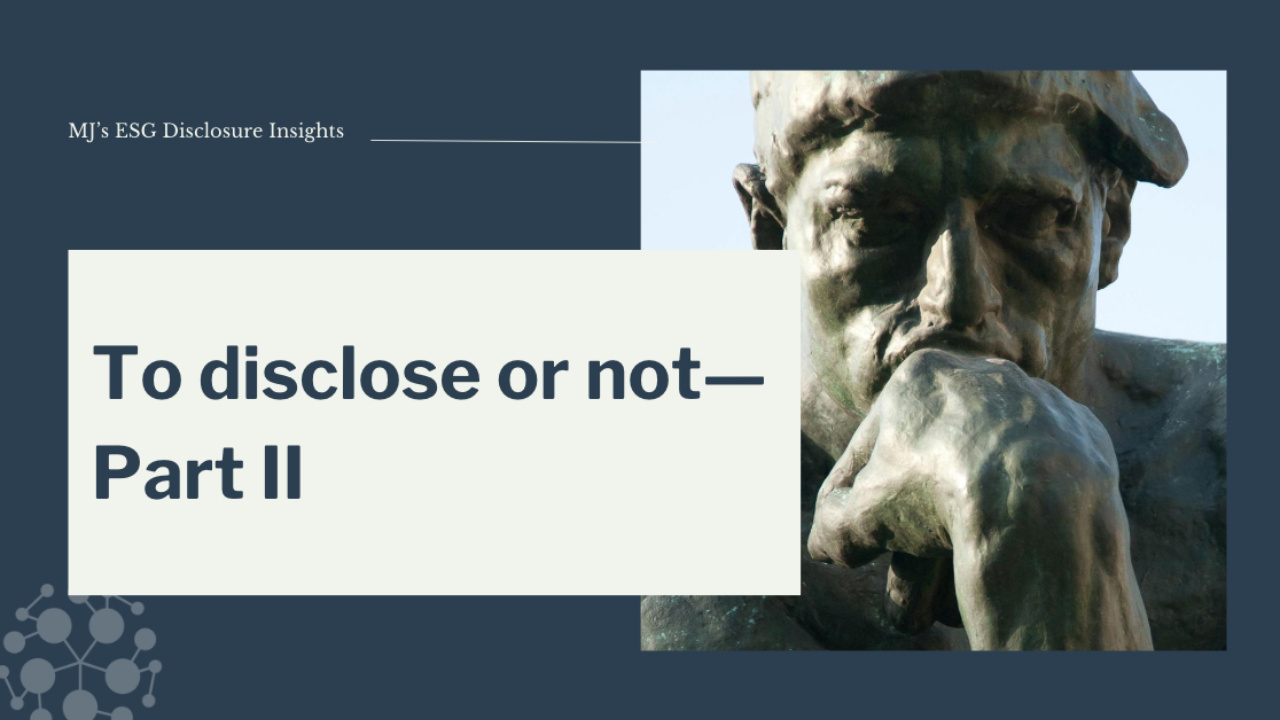To disclose or not - part II
Mar 11, 2025
In the near term, fewer companies will be subject to disclosure regulations than previously expected, what with the pullback on all things climate and ESG in the US and the obsession with simplification sweeping the European Union. Instead, the European Commission is (strongly?) advocating for voluntary disclosures produced using a voluntary standard based on the VSME, which could facilitate achieving standardized disclosures for a broad set of companies.
The European Commission’s Omnibus I legislative proposals call for a drastic reduction in the number of companies in scope of the Corporate Sustainability Reporting Directive (CSRD) – from an estimated 45,000 to approximately 10,000 (assuming that both parent companies and some of their in-scope subsidiaries produce separate sustainability statements - source)
If this legislation passes, a great many companies, both in and outside the European Union, will no longer have a legal obligation to produce ESG or sustainability-related disclosures.
Does that mean they’re completely off the hook? Maybe not.
Companies may need to disclose even if they are not legally obligated to. Consider a company whose customers are requiring that it submit to a third-party ESG rating, or that it produce greenhouse gas emissions data – and maybe even (yikes!) science-based targets for reducing those emissions – or else risk losing the contracts from said customers. Most would agree that this company very much needs to disclose in order to secure its revenues and remain a going concern.
So, it’s pretty clear that in the absence of disclosure regulations, companies must still determine for themselves whether they need to disclose. And if they do, the next step is determining precisely what they need to disclose.
The European Commission is trying to address this particular question by advocating for the use of a proportionate voluntary standard, which will be based on the voluntary reporting standard for small- and medium-sized enterprises (VSME) published by EFRAG in January. Even while waiting for the legislative process to unfold, the Commission intends to issue a recommendation on voluntary sustainability reporting based on the VSME “as soon as possible”.
About the VSME
The VSME has been designed with the specific intention to provide a standardized set of information to replace the current multiple and uncoordinated questionnaires and ESG data requests that companies currently receive from business partners (i.e., large customers, investors, investors, and banks) and which have become a real pain point for smaller companies. The VSME is based on the European Commission’s SME Relief Package of September 2023, which refers to this specific standard as a measure to support SMEs in accessing sustainable finance.
The VSME is structured under a Basic Module (11 disclosures) and a Comprehensive Module (9 disclosures); companies can choose to do the first, or both. The two modules are expected to fulfil a substantial part of requests that companies currently receive. Some aspects worth highlighting:
- Removal of the materiality concept: replaced with the ‘if applicable’ principle, guiding SMEs by pre-defining circumstances that trigger disclosure while remaining consistent with the sustainability issues across ESG topics identified in the ESRS
- Modularity and simplified language: the language of the standard has been carefully simplified, while the modularity allows for flexibility and progression in disclosures
- Confidentiality concerns: EFRAG has clarified that the primary function of a report prepared with the VSME is to inform business counterparties, so the main purpose is bilateral exchange of information; in other words, this is not about encouraging companies to make their sustainability information publicly available, although they are free to do so
The benefits of widespread adoption of the VSME are pretty obvious: for companies, it circumscribes the amount of information they must disclose, consolidating potentially multiple, burdensome requests into a single output; for their business counterparties using this information, it means more available and comparable information.
A panoply of support mechanisms 🤞
When it published this standard, EFRAG greatly emphasized that the widespread adoption of the VSME hinged on acceptance by market participants to replace their questionnaires, thus nudging SMEs to adopt them in producing their disclosures. This is all about streamlining disclosures through the value chain.
To this end, the Commission’s endorsement and support for a voluntary standard based on the VSME may open the door to the development of free tools and platforms for companies, which EFRAG has recommended. Tools such as an online reporting platform, i.e., a repository where companies can populate online templates and where counterparties can have access to the data — even download the necessary data and ditch their questionnaires. Or digital tools such as online (GHG) calculators and (geolocation-based) databases to simplify the usability of the VSME for companies.
For its part, EFRAG had already announced plans to launch a series of complementary initiatives under a so called VSME Ecosystem, including (i) templates of the VSME report and mockup disclosures; (ii) guidelines for, and examples of, policies or actions in relation to sustainability issues to be used as a dropdown menu for a future VSME online template; (iii) examples of climate change actions or transition plans for SMEs; and (iv) examples of impacts on workers in the value chain and affected communities for SMEs and others.
Here's hoping.
A path forward ❓
Even when the CSRD was believed to be a sure thing, my reaction to the publication of the VSME was that it could possibly be the most significant development in corporate sustainability reporting to drive the change towards widely available, comparable, reliable sustainability-related information, addressing the fat tail of the market comprising millions of companies. An expanded voluntary standard would make that truer still.
While we wait to see where the European legislative changes to land, I recommend checking out the VSME.



